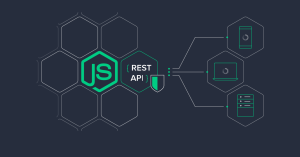Node.js: Unleashing the Power of Server-Side JavaScript
In the realm of web development, speed, scalability, and flexibility are paramount. Node.js, a powerful runtime environment for JavaScript, has emerged as a game-changer in this regard. In this comprehensive guide, we’ll dive deep into Node.js, exploring its foundations, core features, real-world applications, and the reasons behind its widespread adoption.
Understanding Node.js
Node.js, often simply referred to as Node, is an open-source, cross-platform runtime environment that executes JavaScript code outside of a web browser. Unlike traditional JavaScript, which primarily runs in web browsers, Node.js enables developers to use JavaScript on the server-side. It was created by Ryan Dahl in 2009 and has since gained significant traction in the web development community.
 Key Components of Node.js
Key Components of Node.js
- V8 JavaScript Engine: At the heart of Node.js is the V8 JavaScript engine, developed by Google. This engine compiles and executes JavaScript code at lightning speed, making Node.js incredibly performant.
- Libuv: Libuv is a C library that provides an event loop and asynchronous I/O capabilities to Node.js. It allows Node.js to handle non-blocking operations efficiently, making it suitable for building highly scalable applications.
- NPM (Node Package Manager): NPM is the default package manager for Node.js. It allows developers to easily install, manage, and share third-party packages and libraries, streamlining the development process.
Benefits of Node.js
Node.js offers a plethora of advantages that have contributed to its popularity:
- Speed: Thanks to the V8 JavaScript engine, Node.js is exceptionally fast. It’s ideal for building applications that require real-time updates or handling a large number of concurrent connections.
- Scalability: Node.js is designed with scalability in mind. Its non-blocking, event-driven architecture allows it to handle a high volume of concurrent requests without slowing down.
- JavaScript Everywhere: With Node.js, developers can use JavaScript on both the client and server sides. This unification simplifies code sharing and maintenance.
- Large Ecosystem: Node.js boasts a vast ecosystem of libraries and packages available through NPM. This rich collection of tools accelerates development and reduces the need to reinvent the wheel.
- Active Community: Node.js has a vibrant and active community of developers who continually contribute to its growth and improvement. This ensures that the technology remains up-to-date and well-supported.
Real-World Applications
Node.js is not limited to a specific domain or industry; it has found applications in various areas:
- Web Applications: Node.js is widely used for building web applications, both on the server and client sides. Popular web frameworks like Express.js simplify the development of robust web applications.
- API Development: Node.js is an excellent choice for creating APIs (Application Programming Interfaces). Its speed and non-blocking nature make it suitable for serving data to front-end applications.
- Real-Time Applications: Node.js excels in real-time applications like chat applications, online gaming platforms, and collaborative tools. Its ability to handle many concurrent connections in a non-blocking manner is ideal for such scenarios.
- IoT (Internet of Things): Node.js is used in IoT projects due to its lightweight nature and support for event-driven programming. It can control and manage IoT devices efficiently.
- Microservices: Node.js is well-suited for building microservices architectures, where applications are composed of small, independently deployable components. Its speed and scalability make it a great fit for this approach.
Getting Started with Node.js
If you’re eager to start your journey with Node.js, here are some steps to guide you:
- Installation: Begin by downloading and installing Node.js and NPM from the official website. Node.js includes both the runtime environment and the package manager.
- Learning JavaScript: If you’re not already proficient in JavaScript, take the time to learn the language’s fundamentals. This knowledge is essential for effective Node.js development.
- Exploring Documentation: Node.js has extensive documentation that covers various aspects, from basic setup to advanced topics. Dive into the official documentation to gain a deeper understanding.
- Creating Your First App: Start with a simple Node.js application. You can build a web server, a basic API, or even a chat application to get hands-on experience.
- Leveraging Online Resources: The Node.js community is known for its helpfulness. Utilize online forums, tutorials, and courses to expand your knowledge and seek assistance when needed.
Conclusion
Node.js has revolutionized the world of web development by allowing developers to utilize JavaScript on the server-side. Its exceptional speed, scalability, and versatility have made it a go-to choice for a wide range of applications. Whether you’re building real-time web applications, APIs, or IoT solutions, Node.js provides the tools and performance required to succeed.
As you embark on your Node.js journey, remember that practice and exploration are key. Start small, experiment, and gradually tackle more complex projects. With a supportive community and a technology stack that empowers innovation, Node.js opens up a world of possibilities for developers. So, dive in, harness the power of Node.js, and build the next generation of web applications with confidence and creativity.

